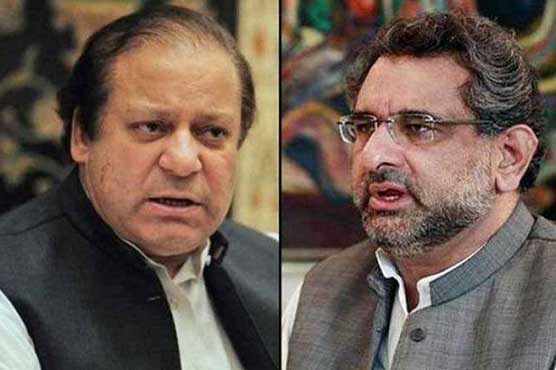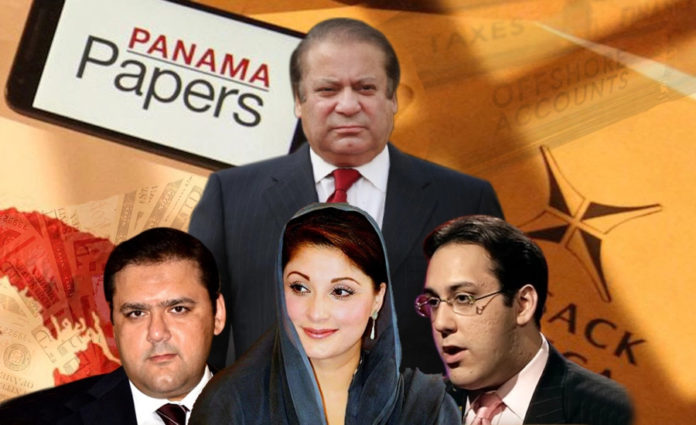Living in desperate times, former Prime Minister Mian Nawaz Sharif is toking desperate measures to avoid the storm that looms large. After the PanamaGate verdict by the Supreme Court disqualifying the PM from holding office and instructing NAB to file references against the PM, his sons and daughter, the PML (N) has gone on the offensive using questionable tactics to belittle the verdict. Toking the rostrum PML (N) stalwart’s ore hurling insults, using unacceptable language, all the while professing their leader’s “innocence” and offering arguments that defy common sense. While allegations against Nawaz Sharif hove proven to be true, they point towards a much broader issue of the lock of account ability in Pakistan. As trustees the representatives ore accountable to the people but when proper mechanisms to make them more accountable ore missing, the people resign themselves to this cycle of corruption and lose faith in democracy. The grim reality of Pakistan is that 40% of its population of more than 200 million lives in extreme poverty without access to even a one-time meal and the basic necessities of life. On the other hand less than 5% of the corrupt mafia holds most of the wealth and no one has held them accountable. Perhaps now with the PanamaGate judgement coming on the heels of our 70th Independence Day, one can hope this will transform how politics will be conducted with across the board accountability and usher in a society that is free of corruption. For the benefit of readers I am reproducing my article titled “AM I THE STATE?”
A month or so plus 40 years ago the democratically elected government of Zulfikar Ali Bhutto was toppled in a coup in 1977 by Gen Zia-ul-Haq. Initially, Zia could have been sincere about holding “free and fair elections” within 90 days. The aura of wielding absolute power, extenuating political circumstances and apprehension of a vengeful Bhutto running rampant dissipated whatever sincerity, if any, he had to start with.
Instead of keeping his cool after the military takeover on July 5 as would behave a consummate politician, an arrogant Bhutto opted for defiance. The parading of his political strength reinforced the military hierarchy’s inclination to take their gloves off. Bhutto’s hanging in April 1979 created a vacuum and a fresh lot of corrupt opportunists entered politics. Many of the current leadership across the broad political spectrum are products of Zia’s 1985 party-less election. A loyal protégé of the military dictator, Sharif has been forcibly removed from the Prime Minister (PM) of Pakistan’s office three times, first by the Establishment in the form of President Ishaq in 1993, then by the Army’s counter to the civilian coup by Sharif removing Musharraf in 1999 and now by the judiciary in 2017. A favorite Sharif ploy of blaming the Army has pathological overtones, he conveniently forgets he only got a level playing field in 1993 to contest free and fair elections when the then COAS Gen Waheed Kakar sent President Ishaq Khan home.
Nawaz Sharif is living under the delusion that by confrontation the superior judiciary will be cowed down into stopping the references to NAB. Can NAB ignore the virtual plethora of incriminating evidence accumulated by the JIT on him and his family? Z.A. Bhutto in 1977 was not facing a viable political contender like Imran Khan nor facing the judiciary’s option of exercising Article 190 of the Constitution. Planning early elections in Nov/Dec 2017, the PML (N) wanted political “Shahadat” at the hands of the Army rather than by the judiciary, fortunately, Qamar Bajwa has kept his cool in the face of grave provocation. Nawaz Sharif now accuses the Supreme Court (SC) of a conspiracy, blatantly claiming in the face of well-established facts that he does not still know why he was disqualified.

The ruling party feeling itself unjustly treated because both they and the opposition ignore the importance of Articles 62 and 63 in the Constitution for Pakistan. Hints are being dropped by Sharif’s successor Shahid Khaqan Abbasi that Article 62 would be amended or scrapped from the Constitution. Having a feudal mind set, neither Mian Nawaz Sharif nor the political class of Pakistan really understands that a modern state is based not on individuals or families or clans but on institutions and laws should function in the same way regardless who is running them. A state is as strong as its institutions and laws are, those rulers of a country who undermine both are actually undermining the state as such.
As much as the elected executive, the judiciary, the military and above all the Constitution are major parts of the Pakistani state, so are the administration and the parliament. Whosoever undermines or denigrates any of them is actually damaging and destabilizing the state. The laws of the lands to cannot be changed according to the whims of a ruling power in order to stay in power or to cover up for corruption, money-laundering, and theft. Such evil and criminal moves can destroy the state itself, case in point Sindh Govt’s undue haste to eliminate NAB’s laws from being applied in the Province. Those who in Pakistan think that they are the state in exclusion of the Constitution and the rule of law are wrong. The travesty of feudal mindset cannot be sustained. Pakistani society is not modern and instead of democratically minded it is strongly hierarchical is based on inequality. Family, clan, biradri, and tribe–all are hierarchical with close to absolute power to the leader. All these structures are present in feudalism but not in a modern society. Changes underway are slow and not strong enough to uphold a modern state. This situation leads them to the reverse, in the absence of a strong state that protects all of its citizens, traditional structures like caste and tribe are reinforced as the only means of support and social security for its members.
Conscious efforts have to be made in education and economic development to strengthen and not undermine its institutions and laws. In a modern state the Constitution is the supreme law of the land and it like all other laws has to be upheld and interpreted by an independent judiciary – independent from other institutions of the state but bound by the Constitution. Another necessary institution of the state the military is responsible for both the external and the internal security of the land. The Army has been playing a larger than normal role because of other institutions – like Parliament for instance are weak and unable to fulfill their tasks. While military rule should not be promoted and a political role is not conducive for the Army as an institution, the structural imbalances within the Pakistan state have a history and can be put right only in a process of modernization of the whole of Pakistani society.
The Islamabad-Lahore rally is nothing but utter contempt for the rule of law and the Constitution. With almost the entire Federal Cabinet in or on a container, governance is in a state of limbo in Pakistan. While it is the right of everyone to take issue with any legal verdict against them, there is a proper forum of it. To do so vocally in unbecoming language and to impute motives is not only shocking but when incitement against the state’s primary institutions is done by a senior political leader who has held the highest public office; it is not only disgraceful and unacceptable but dangerous. Can the people’s mandate supersede the rule of law and the Constitution, and the Army at best only be ceremonial to pay homage to Maryam’s uncle Modi? Without accountability being rendered it will bring anarchy into the land.
Desperate persons will resort to desperate means. The perception of defiance has been created for public consumption; Sharif’s desperation manifest in the GT Road is to keep himself and his immediate family from being convicted under the NAB Ordinance. Our political class is displaying a feudal mind set, conforming to what the King Louis the 14th King of France said, ‘l’etat c’est moi’, meaning “I am the state”.




